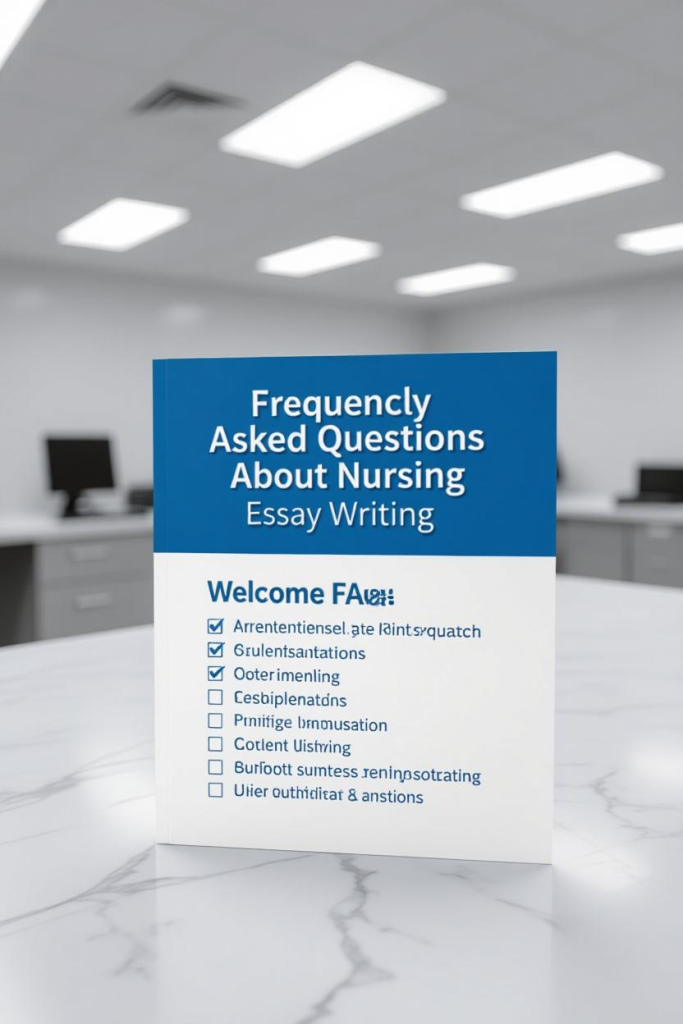
- 1. Understand the Assignment (The First Step to a Great Nursing Essay writing)
- 2. Do Thorough Research (The Heart of a Strong Nursing Essay writing)
- 3. Create a Clear Structure of your Nursing Essay (Your Essay’s Roadmap)
- 4. Write in a Professional, Compassionate Tone (Balancing Science and Humanity)
- 5. Edit and Proofread your nursing essay (The Final Step Before Submission)
- Frequently Asked Questions (FAQs) About Nursing Essay Writing
Writing a nursing essay is one of the most important parts of nursing school. Whether it’s a reflective journal, a case study, or an evidence-based practice paper, your essays show how well you understand patient care, ethics, and critical thinking. But let’s be honest—between long shifts, clinical placements, and exams, finding time (and energy) to write a polished essay can feel overwhelming.
That’s where knowing how to approach nursing essays according to Essayassits.com—and when to ask for expert help—can make all the difference.
1. Understand the Assignment (The First Step to a Great Nursing Essay writing)
Before you even open a Word document, take time to carefully analyze what the assignment is asking you to do. Many nursing students rush straight into writing, only to realize halfway through that they’ve misunderstood the question. This can cost valuable marks—even if the essay is well-written.
Here’s how to approach it:
🔹 Break Down the Nursing Essay Question
- Identify the keywords: Words like analyze, evaluate, reflect, discuss, or compare tell you exactly what the professor expects. For example, “Discuss the importance of patient-centered care in nursing practice” means you must explain multiple perspectives, not just define it.
- Spot the topic: Is it about patient safety, ethics, cultural competence, or evidence-based practice? Highlight the central theme.
- Note the scope: Some questions ask about “nursing practice in general,” while others focus on a “specific population” (e.g., pediatric, geriatric, or mental health nursing). Don’t go too broad or too narrow.
🔹 Clarify the Type of Nursing Essay

Different assignments call for different approaches:
Essaassits.com classifies nursing essays into different types to enables students have a wide rage to choose from
- Reflective essays – Ask you to connect personal experience (like a clinical placement) with nursing theory.
- Case studies – Require applying nursing models and evidence to a patient scenario.
- Research-based essays – Expect a critical review of literature, supported by APA citations.
- Ethics papers – Focus on dilemmas in practice, requiring a balanced, well-argued perspective.
🔹 Check the Requirements
- Word count: Going too short or too long often results in lost marks.
- Referencing style: Nursing programs typically use APA, but always double-check.
- Deadline: Map out a timeline so you’re not cramming the night before.
🔹 Ask Questions Early
👉 Mastering this first step ensures you start on the right track. Think of it like assessing a patient: before you plan care, you need a full and accurate understanding of the situation. The same applies to nursing essays.
Every nursing essay has a purpose. Some test your theoretical knowledge, while others evaluate your ability to apply that knowledge in real-life scenarios. Before you start, break down the assignment question:
- What is the main topic?
- Which type of essay is required (reflective, analytical, research-based)?
- What is the word count and deadline?
Great choice 👍 — let’s expand Section 2: Do Thorough Research so your nursing essay writing blog feels more like a full guide. Here’s a detailed version:
2. Do Thorough Research (The Heart of a Strong Nursing Essay writing)
Good nursing essays aren’t built on opinions alone—they’re built on evidence-based practice. In the healthcare field, decisions must be supported by reliable data, not assumptions. That’s why thorough research is one of the most important steps in essay writing.
Here’s how to make your research count:
🔹 Use Trusted Sources
Not all information is equal. Professors expect you to use credible, peer-reviewed materials. Focus on:
- Scholarly nursing and medical journals (e.g., Journal of Advanced Nursing, American Journal of Nursing).
- Textbooks and reference guides (especially those recommended in your course).
- Professional standards and guidelines (e.g., ANA, NMC, WHO, CDC).
- Evidence-based databases like PubMed, CINAHL, or Cochrane Library.
🔹 Gather a Variety of Perspectives
Nursing is multidimensional. For example, if you’re writing on patient-centered care, you might research:
- Clinical benefits (improved outcomes, patient satisfaction).
- Ethical aspects (autonomy, dignity).
- Organizational perspectives (reducing readmissions, cost-effectiveness).
By pulling from different angles, your essay becomes balanced and persuasive.
🔹 Take Organized Notes
One common mistake is drowning in research and forgetting where information came from. To save yourself headaches later:
- Keep a research journal or spreadsheet with sources, page numbers, and key quotes.
- Highlight points that directly support your thesis.
- Note down proper APA reference details immediately (author, year, title, DOI).
This makes citations easy and prevents accidental plagiarism.
🔹 Stay Current
Nursing is constantly evolving with new studies, technologies, and best practices. Professors value up-to-date sources—ideally published within the last 5–7 years. Only use older sources if they’re “classic” works or foundational theories (like Florence Nightingale’s model).
🔹 Evaluate the Evidence
Not all studies carry the same weight. Learn to ask:
- Was this a peer-reviewed study?
- How big was the sample size?
- Is the research applicable to my essay’s context (e.g., pediatric vs. geriatric care)?
Strong essays show that you’ve thought critically about your sources, not just listed them.
👉 Thorough research not only strengthens your arguments but also shows professors you can think like a professional nurse—using evidence to guide decisions, just as you would in practice.
Would you like me to move on and expand Section 3: Create a Clear Structure in the same detailed way, so this blog becomes a complete “step-by-step nursing essay writing guide”?
Nursing essays should be evidence-based. Use reliable sources like peer-reviewed journals, textbooks, and professional guidelines (e.g., the American Nurses Association Code of Ethics). Avoid relying too heavily on blogs or non-academic websites.
Tip: Keep track of your sources as you go—it saves time when formatting citations.
3. Create a Clear Structure of your Nursing Essay (Your Essay’s Roadmap)
Once you’ve understood the assignment and gathered strong research, the next step is organizing your ideas into a clear, logical structure. A well-structured essay doesn’t just help the reader follow your argument—it also makes your writing process smoother. Think of it like a nursing care plan: structure ensures you don’t miss critical steps.
🔹 The Classic Nursing Essay Format
Most nursing essays follow a simple three-part structure:
- Introduction
- Start with a hook: a thought-provoking fact, statistic, or short scenario related to your topic.
- Provide brief context—why is this topic important in nursing?
- End with a thesis statement: your central argument or purpose in one clear sentence.
📌 Example: “This essay will analyze the role of evidence-based practice in reducing hospital-acquired infections, arguing that strict adherence to guidelines significantly improves patient safety and outcomes.”
- Body Paragraphs
Each paragraph should focus on one main idea supported by research and examples. Use the PEEL method (Point, Evidence, Explanation, Link):- Point: State your argument (e.g., “Patient-centered care improves recovery rates”).
- Evidence: Back it up with a study, guideline, or statistic.
- Explanation: Discuss what the evidence means in nursing practice.
- Link: Connect back to your thesis or lead into the next point.
📌 Tip: Use headings or subheadings (if allowed) to keep long essays organized—for example: “Patient Safety,” “Ethical Considerations,” “Impact on Nursing Practice.”
- Conclusion
- Restate your thesis in a new way (don’t copy-paste).
- Summarize your key findings.
- End with a reflection on the implications for nursing practice or future research.
📌 Example: “In conclusion, evidence-based infection control not only reduces patient risk but also strengthens trust in nursing care, underscoring the nurse’s role as both a caregiver and patient advocate.”
🔹 Use Transitional Phrases
Smooth transitions guide the reader. For example:
- “In addition to improving patient satisfaction, cultural competence also strengthens nurse-patient relationships.”
- “However, some studies suggest that challenges remain in…”
🔹 Match Structure to Essay Type
Different assignments need slight adjustments:
- Reflective nursing essay – Introduction, description of experience, reflection, and conclusion.
- Case study – Patient background, nursing assessment, interventions, and evaluation.
- Research nursing essay – Introduction, literature review, analysis/discussion, and conclusion.
👉 A clear structure is like a roadmap: it keeps you focused, prevents repetition, and makes your argument persuasive. Just as patients feel reassured when nurses communicate clearly, professors appreciate essays that are well-organized and easy to follow.
Would you like me to go ahead and expand Section 4: Write in a Professional, Compassionate Tone next, so the blog flows into the “style and voice” side of nursing essay writing?
4. Write in a Professional, Compassionate Tone (Balancing Science and Humanity)
Nursing essays are unique compared to other academic papers. They demand both professional precision (backed by evidence) and compassionate reflection (rooted in empathy and ethics). Striking this balance is what makes your writing stand out.
🔹 Keep It Academic and Objective
Even though nursing involves emotion and empathy, your essay should maintain a professional academic style. That means:
- Use formal language (avoid slang, text abbreviations, or overly casual phrases).
- Stick to the third person for most essays (e.g., “The nurse must consider patient autonomy” rather than “I think nurses should…”).
- Be concise—say what you mean clearly, without unnecessary words.
📌 Example: Instead of writing, “A nurse should be really careful when taking care of patients because otherwise they might not get better,” write, “Nurses must exercise vigilance in patient care to ensure safety and promote recovery.”
🔹 Show Empathy Where Appropriate
Some nursing essays—especially reflective pieces—require a more personal, compassionate tone. Here, it’s okay to:
- Write in the first person when describing your clinical experiences.
- Reflect on how a situation made you feel and what you learned from it.
- Emphasize values like dignity, respect, and cultural sensitivity.
📌 Example: “During my clinical placement, I realized how small gestures of empathy—such as active listening—can transform a patient’s experience of care.”
🔹 Integrate Evidence Naturally
Avoid just dropping quotes or statistics into your essay. Blend them smoothly into your writing:
- Correct: “According to the American Nurses Association (2021), patient advocacy is a fundamental role of nursing, reinforcing the importance of…”
- Incorrect: “Patient advocacy is important. (ANA, 2021).”
The first example sounds professional and persuasive; the second feels unfinished.
🔹 Stay Respectful and Ethical
When writing about patients, always:
- Use anonymized details (no real names or identifying info).
- Be respectful—don’t describe patients in a way that could seem judgmental.
- Focus on learning outcomes rather than mistakes.
📌 Example: Instead of, “The patient was non-compliant and difficult,” write, “The patient expressed hesitancy toward treatment, which highlighted the need for better communication strategies.”
🔹 Balance Technical and Human Language
Nursing essays sit at the crossroads of science and humanity. You’ll often need to combine clinical terminology with human-centered writing.
- Clinical: “Hypertension management requires adherence to pharmacological interventions.”
- Human-centered: “Patients managing hypertension also benefit from empathetic counseling to support lifestyle changes.”
Together, these approaches show you can think like both a scientist and a caregiver.
👉 In short, writing in a professional, compassionate tone shows your professors that you not only understand nursing theory but can also embody the values that make nursing a caring profession.
5. Edit and Proofread your nursing essay (The Final Step Before Submission)

Even the most insightful nursing essay can lose marks if it’s full of grammar mistakes, unclear sentences, or missing citations. Editing and proofreading are like the “quality checks” of academic writing—similar to double-checking a patient’s chart before handing it off.
🔹 Step 1: Take a Break Before Editing
After writing your first draft, step away for a few hours (or overnight if possible). Coming back with fresh eyes helps you catch errors you would otherwise miss.
🔹 Step 2: Review for Structure and Flow
- Does your essay follow a logical order (introduction → body → conclusion)?
- Do your paragraphs transition smoothly?
- Is each section connected to your thesis statement?
📌 Tip: Read your essay out loud—it’s easier to spot awkward phrasing when you hear it.
🔹 Step 3: Check for Clarity and Conciseness
Nursing professors value clear communication (just like in patient care). Watch out for:
- Long, confusing sentences → break them into shorter ones.
- Repetition → say it once, clearly.
- Jargon → only use medical terms when necessary, and explain them briefly if they’re uncommon.
🔹 Step 4: Polish the Language
- Check for grammar, spelling, and punctuation errors.
- Make sure you’re writing in an academic, professional tone.
- Avoid filler words like “very,” “really,” “a lot”—they weaken your writing.
📌 Example: Replace “Nurses are very important in patient care” with “Nurses play a critical role in patient care.”
🔹 Step 5: Verify Citations and References
Improper referencing is one of the most common reasons students lose marks. To avoid it:
- Double-check you’ve cited all sources used in the essay.
- Ensure the format matches your program’s requirements (often APA 7th edition).
- Cross-check your in-text citations with your reference list—no missing entries!
📌 Tip: Use tools like Zotero, EndNote, or even Word’s reference manager to organize citations.
🔹 Step 6: Get a Second Pair of Eyes
If possible, ask a peer, tutor, or mentor to review your essay. A fresh reader can catch mistakes you’ve overlooked. If no one’s available, read it backward (from the last sentence to the first)—this forces your brain to slow down and notice errors.
🔹 Step 7: Do a Final “Professional Check”
Before submitting, ask yourself:
- Is this essay polished enough to represent me as a future nurse?
- Does it meet all assignment instructions?
- Would I be confident handing this in if it were a real nursing report?
👉 Editing and proofreading may feel tedious, but they’re what separate a good essay from a great essay. Just like nurses double-check medications before administering them, double-checking your writing ensures accuracy, professionalism, and success.
✅ That completes the five-step guide:
- Understand the Assignment
- Do Thorough Research
- Create a Clear Structure
- Write in a Professional, Compassionate Tone
- Edit and Proofread
When to Consider a Nursing Essay Writing Service at Essyassts.com
Sometimes, despite your best efforts, deadlines pile up, clinical hours run long, and essays fall to the bottom of the priority list. A nursing essay writing service can help by:
Writing a nursing essay can feel overwhelming—especially when you’re balancing clinical shifts, exams, and personal responsibilities. But with the right approach—understanding the assignment, doing thorough research, structuring your ideas clearly, writing with professionalism and compassion, and carefully editing—you can turn any essay into a powerful showcase of your knowledge and growth as a future nurse.
Still, sometimes deadlines pile up or assignments feel too complex. That’s when getting expert guidance can make all the difference. A reliable nursing essay writing service doesn’t just save you time—it helps you learn how to structure, reference, and polish essays to the highest academic standards.
👉 At EssyAssits.com, we specialize in helping nursing students like you succeed. Whether you need a custom-written essay, editing support, or help understanding tricky topics, our team of experienced nursing and healthcare writers is here to guide you every step of the way.
Take the stress out of essay writing—focus on your future in nursing while we handle the writing.
📌 Ready to get started? Order your nursing essay today at EssyAssits.com
Frequently Asked Questions (FAQs) About Nursing Essay Writing

1. What makes a nursing essay different from other essays?
They combine academic research with practical application, often requiring reflection on clinical experiences and patient care.
2. How do I choose a topic for my nursing essay?
Pick something specific, researchable, and relevant—like patient safety, ethics, or cultural competence.
3. How long should a nursing essay be?
It varies—1,000 words for reflective essays, 2,500+ for research papers. Always follow your assignment’s requirements.
4. Which citation style should I use?
Most nursing programs require APA 7th edition, though some allow Harvard or MLA.
5. How can I make my essay more professional?
Use formal language, evidence-based arguments, and a clear structure.
6. Can I use personal experiences in a nursing essay?
Yes—in reflective essays. Just protect patient confidentiality and link experiences to theory.
7. How do I avoid plagiarism in nursing essays?
Paraphrase carefully, cite all sources, and track references as you research.
8. What if I don’t have enough time to write my essay?
You can seek help from a nursing essay writing service for expert guidance and timely support.
9. What is the best website for nursing essay writing services?
The best services provide plagiarism-free work, nursing-trained writers, and proper APA formatting. 👉 EssyAssits.com is a trusted choice for nursing students, offering expert writers, confidentiality, and on-time delivery.
10. Where can I buy my nursing essays?
You can buy nursing essays online from academic writing platforms. 👉 At EssyAssits.com, you can order custom-written, plagiarism-free nursing essays crafted by experts in healthcare and nursing.
Conclusion
Nursing essays are more than just assignments—they’re training for real-life decision-making and patient advocacy. Mastering them takes time, but you don’t have to do it all alone. With smart strategies and support from a reliable nursing essay writing service, you can stay on top of your workload and focus on what truly matters: becoming the best nurse you can be.
Would you like me to add a CTA (call-to-action) at the end, like “Get expert help with your nursing essays today” with a service link, or keep it more neutral and informative?
